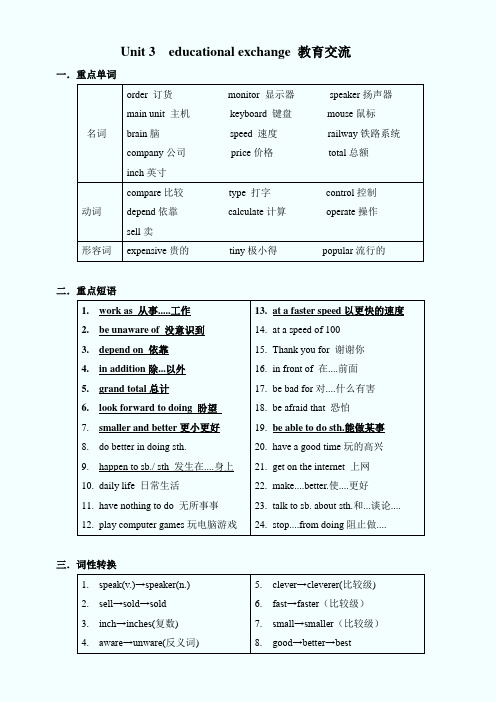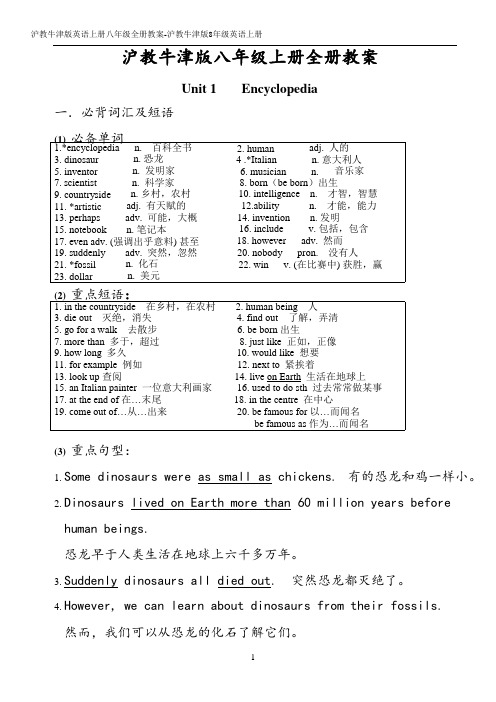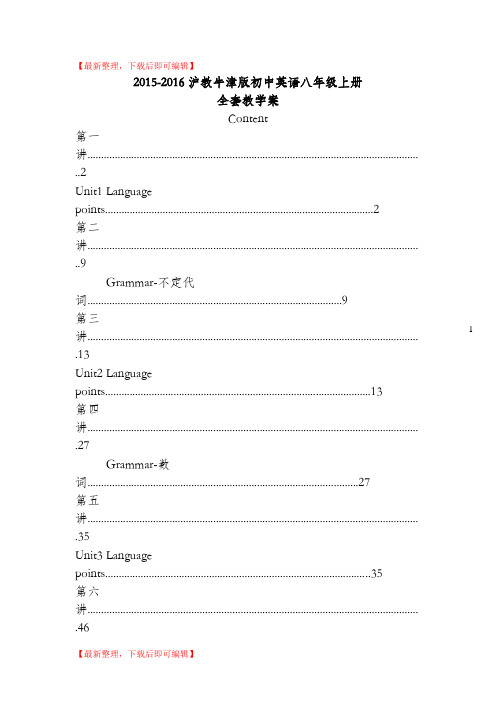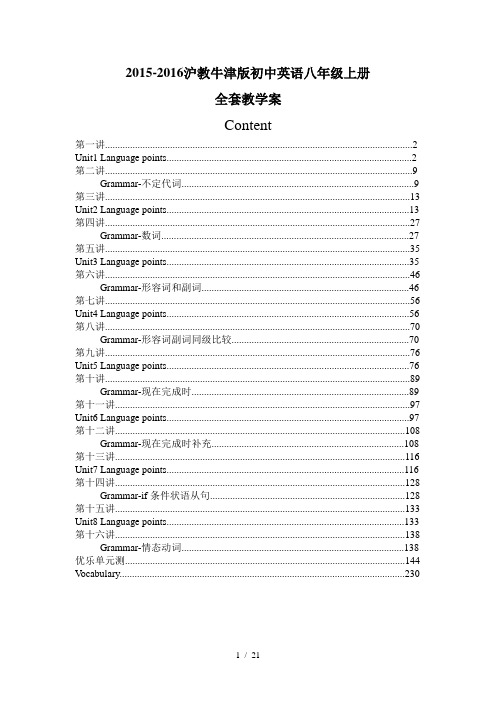牛津沪教版英语八年级上册特殊疑问句和现完过完复习学案
沪教牛津版-英语-八上-初中英语八上 Unit6精编学案与习题

新版深圳广州沈阳牛津版八年级英语上Unit 6 Ancient stories知识点讲解及语法练习重点单词1.difference n. 差别different adj. 不同的2.succeed v 达到目的;实现目标succeed in doing sthsuccess n 成功successful adj成功的3.wood n 木头wooden adj4.lucky adj unlucky adj luck n5.Greek n 希腊人adj 希腊的Greece 希腊6.sleep v asleep adj.7.sudden adj.突然的suddenly adv.突然地8.open v 打开adj. 开着的close v.关上closed adj. 关着的9.quiet adj. 安静地quietly adv10.punish v 处罚punishment n重点短语及同义词组huge= very big stupid= foolish=not clevermake jokes about= make fun of =laugh atbe full of = be filled with except= not includingin the end= at last enter= go intoempty= have no people in itgive up 放弃give out 颁发give in 屈服一、词汇讲解1. They’ve left a huge wooden horse.他们把巨大的木马留下了。
leave left left(1)遗留;留下I’ve left my umbrella on the bus. 我把伞忘在公交车上。
(2)离开When did you leave London?你什么时候离开伦敦的?(3)leave for 到......地方去I’m leaving for Beijing next month.下个月我要去北京。
新版沪版初中牛津初中英语八级上册Unit精编学案与习题

Unit 3 educational exchange 教育交流一.重点单词名词order 订货monitor 显示器speaker扬声器main unit 主机keyboard 键盘mouse鼠标brain脑speed 速度railway铁路系统company公司price价格total总额inch英寸动词compare比较type 打字control控制depend依靠calculate计算operate操作sell卖形容词expensive贵的tiny极小得popular流行的二.重点短语1.work as 从事.....工作2.be unaware of 没意识到3.depend on 依靠4.in addition除...以外5.grand total总计6.look forward to doing 盼望7.smaller and better更小更好8.do better in doing sth.9.happen to sb./ sth 发生在....身上10.daily life 日常生活11.have nothing to do 无所事事12.play computer games玩电脑游戏13.at a faster speed以更快的速度14.at a speed of 10015.Thank you for 谢谢你16.in front of 在....前面17.be bad for对....什么有害18.be afraid that 恐怕19.be able to do sth.能做某事20.have a good time玩的高兴21.get on the internet 上网22.make....better.使....更好23.talk to sb. about sth.和...谈论....24.stop....from doing阻止做....三.词性转换1.speak(v.)→speaker(n.)2.sell→sold→sold3.inch→inches(复数)4.aware→unware(反义词)5.cl ever→cleverer(比较级)6.fast→faster(比较级)7.small→smaller(比较级)8.good→better→best四.同义词1.order =book=arrange to have 预定2.tiny= very small极小的3.work as = be = act as 从事.....工作4.brain = mind 大脑5.operate = control = run = make sth work 操作6.how much...= what’s the price of....多少钱7.expensive = dear = cost a lot of money贵的8.be unaware of sth.=don’t realize sth = don’t know about sth 没意识到某事9.realize = understand = know about = be aware of 意识到10.depend on= rely on = be decided by = be dependent on依靠11.in addition = besides = what’s more 另外,还有五.重点句型1. In the 1940s , the first computers were bigger than cars.20世纪40年代2.Now computers are becoming smaller and better . 比较级+ and +比较级3. in addition ,computers can do important jobs like operating railways4. You may be unaware of them.5. You depend on computers more than you realize.6. However ,one day computers may be able to do a better job than human beings.7. What will happen to us if computers can do all our jobs?一.英汉互译1.从事.....工作__________2.没意识到_____________3.依靠_________________4.除...以外_____________5.总计_________________6.盼望做某事___________7.更小更好_________________8.发生在...身上___________9.日常生活_________________ 10.无所事事_________________11.以更快的速度_________________12.对....有害_________________13.能做某事_________________14.玩的高兴_________________15.上网_________________16.使....更好_________________二.单词填空。
沪教牛津版8A U1 Grammar(带学案)

LADY: I want _s_o_m__e_ envelopes, please.
some 用于肯定句
SHOP ASSISTANT: Do you want the large size or the small size? LADY: The large size, please. 修饰可数名词复数
I have _s_o_m__e__ money in my pocket, but it is not enough. Can you lend me _s_o_m__e_?
特殊用法:
当表示提出建议或请求,希望得到对方肯定的回答时, Some可用于疑问句。
➢ 希望得到对方的肯定回答
I am very thirsty(渴). May I have some water?
•I saw somebody/someone/something. •Did you see anybody/anyone/anything? •I did not see anybody/anyone/anything.
➢ 含some-的复合不定代词用于 肯定句 . ➢ 含any-的复合不定代词用于 否定句 和 疑问句.
old new borrowed blue
形容词修饰复合不定代词时,要放在复合不定代词 后面 。
something, nobody, anything, anybody, someone
1. What’s on TV tonight? Is there _a_n_yt_h_in_g__ interesting? 2. I saw _so_m__e_o_n_e_ at the corner, but I couldn’t see him clearly. 3. Kitty is sitting alone. She isn’t with _a_n_y_b_o_d_y_. 4. — Can I have _s_o_m_e_t_h_in_g_ to drink, please?
1.1 U5 Educational exchanges 学案(牛津上海版八年级上册)

【学习目标】:掌握现在完成时的用法【学习重点】:使用现在完成时的情况,时间状语,以及完成时和过去式的分别。
【学习过程】:Stage 1 现在完成时的结构●形式:陈述句主语+have/ has (not) + ___________________一般疑问式have/ has (not) +主语+ ________________特殊疑问句:特殊疑问词+have/has +主语+ _______________【巩固练习】写出下列词对应的现在完成时,如:you allow--- you have allowed1. he goes—__________________2. we are—__________________3. you sing—__________________4. they teach —__________________5. I bring —__________________6. she sits —__________________7. we live —__________________8. he opens—__________________完成课本P72Stage 2 如何使用现在完成时1.动作发生在过去,但对现在产生影响Thank you for inviting me, but I have seen the film–Why not sit down and have some bread?--I’d love to, but I have had breakfast.1) I know the character well, because I___________________ (read)it many times.2) I____________ (read) books last weekend, and I want to go out for a walk this weekend.2.表示过去已经开始而且持续到现在的动作或状态I have lived in Shenzhen for ten years. He has learned English since he was five3.现在完成时态常与一些时间状语连用:yet(还,仍然), already(已经), ever(曾经), never, recently(最近), so far(到目前为止), up to now(直到现在), in the past few years, since+过去一个时间点,for +一段时间etc.【巩固练习】用现在完成时填空。
沪教牛津版英语上册八年级全册教案-沪教牛津版8年级英语上册

20. nobody pron. 没有人 22. win v. (在比赛中) 获胜,赢 adv. 突然,忽然 n. 化石 n. 美元 19. suddenly21. *fossil23. dollar10. intelligence n. 才智,智慧 12.ability n. 才能,能力 14. invention n. 发明 16. include v. 包括,包含 18. however adv. 然而 17. even adv. (强调出乎意料) 甚至8. born (be born )出生 音乐家 n. adj. 人的 n. 意大利人 2. human 4 .*Italian 6. musician n. 百科全书n. 恐龙 n. 发明家 n. 科学家 n. 乡村,农村 adj. 有天赋的 adv. 可能,大概 n. 笔记本 1.*encyclopedia 3. dinosaur5. inventor7. scientist9. countryside11. *artistic13. perhaps15. notebook沪教牛津版八年级上册全册教案Unit 1Encyclopedia 一.必背词汇及短语(1) 必备单词(3) 重点句型:1. Some dinosaurs were as small as chickens. 有的恐龙和鸡一样小。
2. Dinosaurs lived on Earth more than 60 million years before human beings.恐龙早于人类生活在地球上六千多万年。
3. Suddenly dinosaurs all died out. 突然恐龙都灭绝了。
4. However, we can learn about dinosaurs from their fossils. 然而,我们可以从恐龙的化石了解它们。
5.Nobody knows why. 没有人知道其中的原因。
沪教牛津版-英语-八上-初中英语八上Unit1精编学案与习题

沪教牛津版-英语-八上-初中英语八上Unit1精编学案与习题Unit 1 Encyclopaedias 词汇Date:_______ name:_______【知识要点】必记单词:encyclopaedia 百科全书dinosaur 恐龙human 人的Italian 意大利人perhaps 可能,大概inventor 发明家invention 发明musician 音乐家notebook 笔记本scientist 科学家include 包括,包含born 出生even 甚至countryside 乡村,农村however 然而intelligence 才智,智慧suddenly 突然,忽然artistic 有艺术天赋的nobody 没有人ability 才能,能力fossil 化石win 获胜,赢dollar 美元必记短语:listen to 听learn about 了解到talk about 谈论be born 出生in the countryside 在乡村,在农村human being 人for example 例如die out 灭绝,消失at the end of 在...的尽头,在...的末尾more than 多于used to 过去常常know about 知道关于...的情况one day 有一天be famous for 因.....而出名so much 如此多find out 了解到,弄清by the window 在窗户旁边next to 挨着be interested in 对....感兴趣be sure 确信go for a walk 去散步in the mountains 在山上do with 处理in the newspaper 在报纸上all kinds of 各种各样的a number of 许多,大量since then 自从那时be made up of 由...组成,构成connect....to 把...和...连接起来词汇解析:1、human 人的,也写作human beingDogs can hear much better than humans. 狗的听觉比人灵敏的多。
沪教牛津版初中英语八年级上册全套教学案

2015-2016沪教牛津版初中英语八年级上册全套教学案Content第一讲 (2)Unit1 Language points (2)第二讲 (9)Grammar-不定代词 (9)第三讲 (13)Unit2 Language points (13)第四讲 (27)Grammar-数词 (27)第五讲 (35)Unit3 Language points (35)第六讲 (46)Grammar-形容词和副词 (46)第七讲 (56)Unit4 Language points (56)第八讲 (70)Grammar-形容词副词同级比较 (70)第九讲 (76)Unit5 Language points (76)第十讲 (89)Grammar-现在完成时 (89)第十一讲 (97)Unit6 Language points (97)第十二讲 (108)Grammar-现在完成时补充 (108)第十三讲 (116)Unit7 Language points (116)第十四讲 (128)Grammar-if条件状语从句 (128)第十五讲 (133)Unit8 Language points (133)第十六讲 (138)Grammar-情态动词 (138)单元测........................................................................................................... .. (144)Vocabulary (230)八年级上册英语教案资料第一讲Unit1◆知识探究1.Is my encyclopaedia useful, Lo1)useful: 有用的,有益的,有帮助的 a useful book2)use +ful= useful 名词+ful= 形容词3)以-ful结尾的形容词的反义词多是相应的以-less结尾的形容词。
牛津沪教版英语八年级上册Unit7 复习学案

八年级上Unit 7复习一、课前回顾上一单元重点单词默写1.__________ v. 跃出;突然弹出2 .____________ n. 圈套;陷阱3. _____________ adj.正确的,真实的;真正的4. _____________ n. 和平, 和睦, 安宁,宁静,平静5.______________ n.善意的行为,恩惠6.______________ v. 信任,信赖上一单元重点短语回顾1.__________________用完2.__________________be close to离……近3._________________ 两层楼高4. ______________________从……出去5. _______________________________开始做某事6.__________________________________帮某人一个忙9.______________________________ 使我们毛骨悚然10. _________________________赞成,支持11. _______________________________(指希望)实现二、本节内容本单元重点单词梳理1. immediately adv.立即;马上e. g. I recognized her immediately. 我立刻认出了她。
He came immediately when he heard the news. 他一听到这个消息,马上就来了。
【近义】at once立刻,马上right now立刻right away立刻【例题】选出与画线部分意思相同或相近的选项。
They're leaving for Nanjing at once.A. at the same timeB. at that timeC. right nowD. just now【解析】at once表示“马上,立刻”,at the same time意为“同时”,at that time意为“在那时”,right now意为“现在:此刻”,just now意为“刚才”,所以正确答案选C。
沪教牛津版英语八年级上册全套教学案【含答案】(完整资料).doc

1【最新整理,下载后即可编辑】2015-2016沪教牛津版初中英语八年级上册全套教学案Content第一讲...........................................................................................................................2Unit1 Languagepoints..................................................................................................2 第二讲...........................................................................................................................9Grammar-不定代词 (9)第三讲 (13)Unit2 Languagepoints.................................................................................................13 第四讲 (27)Grammar-数词...................................................................................................27 第五讲 (35)Unit3 Languagepoints.................................................................................................35 第六讲 (46)2Grammar-形容词和副词 (46)第七讲 (56)Unit4 Languagepoints.................................................................................................56 第八讲 (70)Grammar-形容词副词同级比较 (70)第九讲 (76)Unit5 Languagepoints.................................................................................................76 第十讲 (89)Grammar-现在完成时 (89)第十一讲 (97)Unit6 Languagepoints.................................................................................................97 第十二讲 (108)Grammar-现在完成时补3充 (108)第十三讲 (116)Unit7 Languagepoints...............................................................................................116 第十四讲 (128)Grammar-if 条件状语从句 (128)第十五讲 (133)Unit8 Languagepoints...............................................................................................133 第十六讲 (138)Grammar-情态动词 (138)优乐单元测................................................................................................................144 Vocabulary (230)八年级上册英语教案资料第一讲Unit14◆ 知识探究1. Is my encyclopaedia useful , Lo?1) useful: 有用的,有益的,有帮助的 a useful book2) use +ful= useful 名词+ful= 形容词3) 以-ful 结尾的形容词的反义词多是相应的以-less 结尾的形容词。
牛津上海版八年级英语M1U2复习教案

牛津上海版八年级英语M1U2复习教案第一篇:牛津上海版八年级英语M1U2复习教案上课内容一、知识复习Module 1Nature and environmentUnit 2Water 单词及词组复习freeze v.(froze frozenfreezing)1.stop moving suddenly(突然停止,惊呆),例如:Fear made him freeze in his tracks.恐惧使他突然停止前进。
He froze in front of the audience.他在观众面前吓呆了。
2.冷冻,冷藏(食物),例如:Not all fruit and vegetables freeze well.并非所有的水果和蔬菜都适合冷藏。
plant n.1.building with machines in it 工厂,车间,例如:When the plant closed down, many factory workers lost their jobs.工厂关门了,很多工人失业了。
2.植物,例如:Trees and vegetables are plants.树木和蔬菜是植物。
【词义辨析】:speed;hurry1.speed v.(sped sped speeding)move quickly 指快速运动或行动。
例如:The ambulance sped to the hospital.救护车快速开往医院。
He was arrested for speeding.他因超速行车而被捕。
The train sped through the countryside.火车从乡间飞驰而过。
Postal workers labored overtime to speed delivery of theChristmas mail.邮政工人加班加点已加速圣诞期间新信件的发送。
2.hurry v.move or do sth.quickly or too quickly 意指比通常快得多的速度,经常伴随着混乱或骚动。
八年级上册英语辅导学案沪教牛津版

在撰写本文之前,我首先对你提供的主题进行了全面评估。
八年级上册英语辅导学案沪教牛津版是一个广泛且深度的主题,需要详细分析和讨论。
在本文中,我将从简到繁地探讨这一主题,以便你能更深入地理解。
1. 教材介绍八年级上册英语辅导学案沪教牛津版是一本针对八年级学生的英语辅导教材。
该教材考虑到学生的学习特点和需求,设计了丰富多彩的学案内容,包括听力、口语、阅读、写作等方面的练习。
该教材采用了沪教牛津版的教学理念和教学模式,致力于帮助学生掌握英语基础知识并提高语言运用能力。
2. 学案结构八年级上册英语辅导学案沪教牛津版的学案结构合理,内容丰富。
每个单元包括听力、口语、阅读、写作等部分,覆盖了英语学习的各个方面。
学案的设计不仅注重知识点的讲解和练习,还注重培养学生的语言运用能力和学习策略,使学生能够自主学习和自主探究。
3. 教学理念沪教牛津版的教学理念注重学生的主体地位,倡导“以学生为本,激发学生学习兴趣,培养学生学习能力”的教学理念。
这与当前教育改革的方向相符合,有助于激发学生学习英语的积极性和主动性,提高学习效果。
4. 个人观点我认为八年级上册英语辅导学案沪教牛津版是一本优秀的教材,它不仅符合教育教学改革的要求,而且符合学生的学习需求。
在教学过程中,教师应该根据学生的实际情况,灵活运用这本教材,注重培养学生的语言运用能力和学习策略,使学生能够在实践中学会运用英语,而不是仅仅掌握知识点。
在本文中,我从简到繁地探讨了八年级上册英语辅导学案沪教牛津版这一主题,希望能够帮助你更深入地理解这一教材。
我也共享了我对这个主题的个人观点和理解。
希望这篇文章能对你有所帮助。
八年级上册英语辅导学案沪教牛津版是一本深受学生喜爱的教材,它以其丰富多彩的教学内容和合理的学案结构受到了广泛的认可。
学生在使用这本教辅教材的过程中,可以充分感受到教材的贴心设计和对学生学习需求的关注。
接下来,我将从教材对学生的影响、教学方法和教学效果三个方面进行深入探讨。
新版沪版初中牛津初中英语八年级上Unit6精编学案与习题

新版沪版初中牛津初中英语八年级上Unit6精编学案与习题新版深圳广州沈阳牛津版八年级英语上Unit 6 Ancient stories知识点讲解及语法练习重点单词1.difference n. 差别different adj. 不同的2.succeed v 达到目的;实现目标succeed in doing sthsuccess n 成功successful adj成功的3.wood n 木头wooden adj4.lucky adj unlucky adj luck n5.Greek n 希腊人adj 希腊的Greece 希腊6.sleep v asleep adj.7.sudden adj.突然的suddenly adv.突然地8.open v 打开adj. 开着的close v.关上closed adj. 关着的9.quiet adj. 安静地quietly adv10.punish v 处罚punishment n重点短语及同义词组huge= very big stupid= foolish=not clevermake jokes about= make fun of =laugh atbe full of = be filled with except= not includingin the end= at last enter= go intoempty= have no people in itgive up 放弃give out 颁发give in 屈服一、词汇讲解1. They?ve left a huge wooden horse.他们把巨大的木马留下了。
leave left left(1)遗留;留下I?ve left my umbrella on the bus. 我把伞忘在公交车上。
(2)离开When did you leave London?你什么时候离开伦敦的?(3)leave for 到......地方去I?m leaving for Beijing next month.下个月我要去北京。
沪教牛津版英语八年级上册全套教学案含答案

2015-2016沪教牛津版初中英语八年级上册全套教学案Content第一讲 (2)Unit1 Language points (2)第二讲 (9)Grammar-不定代词 (9)第三讲 (13)Unit2 Language points (13)第四讲 (27)Grammar-数词 (27)第五讲 (35)Unit3 Language points (35)第六讲 (46)Grammar-形容词和副词 (46)第七讲 (56)Unit4 Language points (56)第八讲 (70)Grammar-形容词副词同级比较 (70)第九讲 (76)Unit5 Language points (76)第十讲 (89)Grammar-现在完成时 (89)第十一讲 (97)Unit6 Language points (97)第十二讲 (108)Grammar-现在完成时补充 (108)第十三讲 (116)Unit7 Language points (116)第十四讲 (128)Grammar-if条件状语从句 (128)第十五讲 (133)Unit8 Language points (133)第十六讲 (138)Grammar-情态动词 (138)优乐单元测 (144)V ocabulary (230)八年级上册英语教案资料第一讲Unit1◆知识探究1.Is my encyclopaedia useful, Lo?1)useful: 有用,有益,有帮助 a useful book2)use +ful= useful 名词+ful= 形容词3)以-ful结尾形容词反义词多是相应以-less结尾形容词。
eg: useful--useless careful--careless helpful--helpless2.Leonardo da Vinci was an Italian painter, inventor, musician,engineer and scientist. 动词后加后缀-er/ -or构成一种职业。
牛津沪教版英语八年级上册Unit 5复习学案

4 / 19
牛津沪教版英语八年级上册 Unit 5 复习学案
A postman is someone who delivers mail.邮递员是送邮件的人。 【友情提示】mail 无复数,泛指各种邮件。
17. real adj. 实际存在的,真实的 e. g. That is a real cat, not a toy. 那是一只真猫,不是玩具猫。 That old woman's a real dragon! 那老妇人确实是个凶恶的家伙! 【指点迷津】 (1) real 暗指某事物是真实的或货真价实的,或指看上去或宣称与事实吻合的东西。 e. g. Don’t lose the bracelet;it's made of real gold. 别把手镯丢了,那是真金做的。 (2) true 暗指与事实、现实或事物的真实状态相一致。 e. g. He’s your father. It's true. 他是你父亲。这是真的。
1 / 19
牛津沪教版英语八年级上册 Unit 5 复习学案
【知识拓展】gentleness n. 温顺,亲切,柔和 gently adv. 轻轻地,逐渐地
5. harmful adj. 有害的 e. g. The new drug has no harmful side-effects. 这种新药物没有副作用。
e. g. Typhoons blew fiercely.台风猛烈地刮着。
7. skeleton n. 骨骼,骼髅
e. g. Tommy is so thin that he looks like a skeleton. 汤姆如此瘦,以致看上去瘦骨嶙峋。
A long illness made a skeleton out of him. 长期的疾病使他骨瘦如柴。
2015-2016学年牛津英语沪教版八年级英语上册Unit7精品学案

牛津英语沪教版八年级英语上册Unit 7 Memory一.必背词汇及短语(1)必记单词1. memory n. 记忆力,记性,回忆,记忆2. corner n. 角3. lose v.(lost, lost) 丧失,失去4. improve v. 提高,改善5. mention v. 提到,说到6. method n. 方法7. spelling n. 拼写,拼法8. mind n. 大脑,脑袋9. silly adj. 可笑的10. mile n. 英里11. letter n. 字母12. worth adj. 值得,有价值的13. spell v. 拼写14. unless conj. 除非15. trouble n. 困难16. list n. 清单17. step n. 步骤18. cycle n. 循环19. similar adj. 相像的,类似的20. note n. 纸币21. wallet n. 钱包,皮夹子22. basket n. 篮,筐23. manager n. 经理(2) 重点词组1. take out (从银行账户中)提取(款)2. pour out 涌出3. write down 写下,记下4. for example 例如5. between…and… 在…和…之间6. plan to do sth 计划干某事7. help sb do sth 帮助某人做某事8. wish to do sth 希望干某事9. have trouble (in) doing sth 做某事有麻烦be in trouble with 与…相处有麻烦/ get…into trouble 使…陷入困境10. practice doing sth 练习做某事11. give sb sth/ give sth to sb 给某人某物12. buy sth for sb 为某人买某物13. far away 远离14. live a healthy life 过健康的生活15. one… the other…一个…另一个16. have to 不得不17. It’s + adj + for sb + to do sth 对某人来说做某事是…(3) 重点句子:1. A great way to help you remember something is to imagine a picture of it in your mind. 帮你记住某物的一个好方法是在脑海里想象它的一幅画面。
XX八年级英语上册全套教学案(沪教牛津版)

XX八年级英语上册全套教学案(沪教牛津版)XX-XX沪教牛津版初中英语八年级上册全套教学案content讲................................................. ................................................... .. (2)Unit1Languagepoints................................ ................................................... (2)第二讲................................................. ................................................... .. (9)Graar-不定代词................................................. .. (9)第三讲................................................. ................................................... . (13)Unit2Languagepoints................................ ................................................... .. (13)第四讲................................................. ................................................... . (27)Graar-数词................................................. .. (2)7第五讲................................................. ................................................... . (35)Unit3Languagepoints................................ ................................................... (35)第六讲................................................. ................................................... . (46)Graar-形容词和副词................................................. . (46)第七讲................................................. ................................................... . (56)Unit4Languagepoints................................ ................................................... .. (56)第八讲................................................. ................................................... . (70)Graar-形容词副词同级比较................................................. (70)第九讲................................................. ................................................... . (76)Unit5Languagepoints................................ ................................................... .. (76)第十讲................................................. ................................................... . (89)Graar-现在完成时................................................. .. (89)第十一讲................................................. ................................................... (97)Unit6Languagepoints................................ (97)第十二讲................................................. ................................................... . (108)Graar-现在完成时补充................................................. . (108)第十三讲................................................. ................................................... . (116)Unit7Languagepoints................................ ................................................... (116)第十四讲................................................. ................................................... . (128)Graar-if条件状语从 (128)第十五讲................................................. ................................................... . (133)Unit8Languagepoints................................ ................................................... (133)第十六讲................................................. ................................................... . (138)Graar-情态动词................................................. . (138)优乐单元测................................................. ................................................... (144)Vocabulary......................................... ................................................... . (230)八年级上册英语教案资料讲Unit1◆知识探究Isyencyclopaediauseful,Lo?)useful:有用的,有益的,有帮助的ausefulboo2)use+ful=useful名词+ful=形容词)以-ful结尾的形容词的反义词多是相应的以-less结尾的形容词。
牛津沪教版英语八年级上册英语同义句复习学案

= I return to my home and ____________ a ____________ for an hour. = I return to my home and ____________ a ____________for an hour. 11. Don’t do sth. = You had better not do sth. 例题:Please don’t smoke in the room. = You ___________ ___________ ___________ smoke in the room. 12. What’s the matter with sb.? = What’s wrong with sb.? = What’s the problem with sb.? 例题:What’s the matter with you? = What’s ___________ with you? = What’s the ____________ with you? 13. kind = be friendly to do sth 例题:He is a kind person. He likes helping others. = He is a kind person. He is always ____________ to ____________ others. 14. assist sb. with sth. = help sb. with sth. 例题:My classmates often ask me to assist them with their study. = My classmates often ask me to ____________ them ____________ their study. 15. too adj. for sb. to do sth. = so adj that +句子(否定)= not adj.(反义)enough for sb.to do 例题:Mike is very young. He can’t drive a car. = Mike is ____. = Mike is ____________ old ____________ to drive a car. = Mike is ____________ young ____________ he can’t drive a car. He was so angry that he could say nothing. = He was ____________ angry to say ____________.
沪教牛津版初中英语八年级上册-全套教学案

2015-2016沪教牛津版初中英语八年级上册全套教学案Content第一讲 (2)Unit1 Language points (2)第二讲 (9)Grammar-不定代词 (9)第三讲 (13)Unit2 Language points (13)第四讲 (27)Grammar-数词 (27)第五讲 (35)Unit3 Language points (35)第六讲 (46)Grammar-形容词和副词 (46)第七讲 (56)Unit4 Language points (56)第八讲 (70)Grammar-形容词副词同级比较 (70)第九讲 (76)Unit5 Language points (76)第十讲 (89)Grammar-现在完成时 (89)第十一讲 (97)Unit6 Language points (97)第十二讲 (108)Grammar-现在完成时补充 (108)第十三讲 (116)Unit7 Language points (116)第十四讲 (128)Grammar-if条件状语从句 (128)第十五讲 (133)Unit8 Language points (133)第十六讲 (138)Grammar-情态动词 (138)单元测........................................................................................................... .. (144)V ocabulary (230)八年级上册英语教案资料第一讲Unit1◆知识探究1.Is my encyclopaedia useful, Lo?1)useful: 有用的,有益的,有帮助的 a useful book2)use +ful= useful 名词+ful= 形容词3)以-ful结尾的形容词的反义词多是相应的以-less结尾的形容词。
牛津上海八年级上册-特殊疑问词专项讲解及练习(有答案)

特殊疑问句一、构成:疑问词+一般疑问句三、疑问词的选择(一)对指物名词或谓语动词提出疑问,疑问词用what;关于what的其他疑问词:what color. 【考例】对划线部分提问:1. This sign means cars and buses mustn't turn right here.(2004上海中考)this sign mean?2.The twins were making a kite when their mother came in.the twins when their mother came in?3.Mrs. Turner asked her son to buy some eggs for supper.__ Mrs. Turner ask her son __ ?(二)对修饰名词的定语提出疑问,疑问词应用which,而且通常和名词连用。
【考例】对划线部分提问:1. That new blue car is my father’s. (2007上海中考)________ ________ is your father’s?2.I'm going to take the shirt on the right.are you going to take?3. The boy on the bike is my friend .is your friend ?(三)对指人名词或代词提问用who,作宾语时提问用whom。
【考例】对划线部分提问:They went to the countryside with me .With they to the countryside ?(四)对物主代词和名词所有格提问用whose。
【考例】对划线部分提问:Mike’s book is on the left side of the desk .is on the left side of the desk?(五)①对具体时间提出疑问,如in the morning,last Sunday等,疑问词用when;1.London held the first World Expo in 1851. (2005上海中考)did London the first Word Expo?2. He finished the book last Sunday .he he book ?3. We often go out for a walk in the evening .you often go out for a walk ?②对具体几点钟提问,疑问词应用what time【考例】对划线部分提问:1. I usually get up at six.________________________________________________________2. I got up at six this morning .you up this morning ?(六)对具体地点提出疑问,疑问词应用where。
- 1、下载文档前请自行甄别文档内容的完整性,平台不提供额外的编辑、内容补充、找答案等附加服务。
- 2、"仅部分预览"的文档,不可在线预览部分如存在完整性等问题,可反馈申请退款(可完整预览的文档不适用该条件!)。
- 3、如文档侵犯您的权益,请联系客服反馈,我们会尽快为您处理(人工客服工作时间:9:00-18:30)。
八年级上册特殊疑问句和现完过完复习一、复习思路本节课对主要复习八年级的特殊疑问句和时态现在完成时以及过去完成时的复习。
二、复习要点语法点一: 特殊疑问句I. 特殊疑问句:特殊疑问句由疑问词引导的问句。
常用的疑问词有what, who, whom, whose, which, when, where, why, how, how old, how many, how much, how long, how often, how soon, how far, how fast等。
学生易搞混淆的几个特殊疑问词以及一些复合特殊疑问词(1)就名字提问时学生对于到底是用what还是who存在混淆的现象。
如:Her name is Grace Green?误:Who is her name?正:What is her name ?She is Mrs. Smith.误:What is she? 正:Who is she?注:在就名字提问时,如果只是强调名字本身那么就只能用what,如果强调这一名字指的是哪个人那么就只能用who。
(2)就人提问时到底是用which还是用who存在混淆的现象。
如:The girl in green is her sister.误:Who is her sister? 正:Which girl is her sister ?注:就人提问时,which强调的是人的特征,而who强调的是人的身份。
(3)就数量提问时常把how many与how much搞混淆。
如:There is some water.误:How many water is there? 正:How much water is there ?注:就数量提问时,how many 修饰可数名词(在其后加可数名词复数形式),而how much修饰不可数名词(后跟不可数名词),所以首先要辨别划线部分是可数名词还是不可数名词,然后再确定是用how many还是how much。
(4)学生易把how far与how long搞混淆。
如:It’s seven hundred meters away from here.误:How long is it from here ? 正:How far is it from here ?注:how long问的是事物的长短,而how far问的一处至另一处的距离。
(5)how soon与how long也是学生容易搞混淆的地方。
如:He will be back in four days.误:How long will he be back? 正:How soon will he be back ?注:how soon与how long虽然都是表示多久的意思,但二者强调的侧重点不同,how soon问的是动作的将来时间,表示还要多久之意;而how long问的是动作的持续时间,表示要花费多久之意。
且前者的回答一般是由“in+一段时间”来回答,而后者的回答一般用”for+一段时间”。
(6)当句中同时出现频率副词以及时间段时,学生对于使用how long或是how often存在疑惑。
如:He does exercise for two hours twice in a day._______ does he do exercise twice in a day?A.How oftenB. How longC. How farD. How soon注:这里学生没有辨别清楚句子到底是对频率提问还是对一段时间提问,以导致学生选择A答案。
课堂练习之特殊疑问句:练一练1:(划线提问)1.____________ draws well? Peter draws well.2.____________ is very useful? Water is very useful.3.____________ is on the desk? There are two books on the desk.4.____________ classroom is bright? Their classroom is bright.5.____________ fridges are cheaper? The fridges on the right are cheaper.6.____________ is Miss Li? Miss Li is a teacher.7.____________ is Miss Li? Miss Li is my teacher.8.____________ did he ask just now? He asked some questions just now.9.____________ are you taking care of now? I am taking care of my grandma now.10.________ ________ do you like best? I like the one on the left best.11.________ ________ English words have you learned?We have learned 200 English words.12.________ ________ water did he drink just now?He drank two glass of water just now.13.________ _________ do you usually get up? I usually get up at half past six.14.________ do you have lunch? We have lunch at school.15.________ did she go to work yesterday? She went to work by taxi yesterday.练一练2:(选择填空)8.A: ____ have the scientists been there?B: For about two years.A, How many times B, How C, What time D, How long9.A: ____ did the first man walk on the moon?B: In 1969.A, What B, Where C, When D, Why10.A: ____ is it from our school to Lupu Bridge?B: About half an hour’s bus ride. Shall we go and visit it?A, How long B, How often C, How far D, How much练一练3:(划线提问)1.I was born in 1980.________ ________ you born?2.The teacher had a meeting yesterday.________ ________the teacher have a meeting?3.The postage is three yuan and six jiao.________ ________ is the postage?4.We had learned six pop songs by the end of last week.________ ________ six pop songs had you learned by the end of last week?5.He went to the hospital to have a check up on eyesight.________ _______ he go to the hospital?6.We have a class meeting once a week.________ ________ do you have a class meeting?7.At the age of five, Martin weighed 25 kilos.________ ________ did Martin weigh at the age of five?8.He lost the key of his bike on his way to the lecture.________ did he ________ on his way to the lecture?练一练4:(改写句子)1.The farther galaxy (星系) is 13 billion light-years away from the earth. (划线提问) ________ ________ is the farther galaxy?2.The workers in this factory used to go to work by bicycle. (划线提问)________ ________ the workers in this factory use to go to work?3.He will leave Shanghai in two months. (划线提问)________ ________ will he leave Shanghai?4.I will finish cleaning the room in ten minutes. (划线提问)________ ________ you finish cleaning the room?5.It’s twenty minutes’ walk from our school to the underground station. (划线提问) ________ ________ is it from your school to the underground station?6.The students have hamburgers for lunch twice a week. (划线提问)________ ________ do the students have hamburgers for lunch?7.George will finish college in two years. (划线提问)________ ________ will George finish college?8.These children come from ordinary families. (划线提问)________ ________ of families do these children come from?9.The dictionary on that shelf is newly published. (划线提问)________ ________ is newly published?10.We have bread and milk for breakfast every day. (划线提问)________ ________ you have for breakfast every day?11.Long ago, people hunted animals for food. (划线提问)________ ________ people hunt animals long ago?12.I have been to the Great Wall twice. (划线提问)________ ________ times have you been to the Great Wall?13.Linda won the first prize with the help of the teacher. (划线提问)________ did Linda ________ the first prize?14.My father worked as a farmer twenty-five years ago. (划线提问)________ ________ your father work as twenty-five years ago?15.I have lived in this city since 2000. (划线提问)________ ________ have you lived in this city?16.It is ten minutes’ walk from your school to the cinema. (划线提问)________ ________ is it from your school to the cinema?17.It’s 300 metres from my home to school. (划线提问)________ ________ is it from your home to school?18.They organize the film festivals once a year. (划线提问)________ ________ do they organize the film festivals?19.The hospital is about 300 meters away. (划线提问)________ ________ is the hospital?20.Our class usually begins at 8:00 every day. (划线提问)________ ________ ________ your class usually ________ every day?特殊疑问句练一练1:(划线提问)1.Who2.What3.What4.Whose5.Which6.What7.Who8.What9.Who/Whom10.Which one 11.How many 12.How much 13.What time 14.Where 15.How练一练2:(选择填空)1-3 DCC练一练3:(划线提问)1.When were2.When did3.How much4.How many5.Why did6.How often7.How much 8.What lose练一练4:(改写句子)1.How far2.How did3.How soon4.When will5.How far6.How often7.What kind8.Which dictionary9.What do 10.Why did 11.How many 12.How, win 13.What did 14.How long 15.How far 16.How far 17.How often 18.How far 19.What time do, begin 20.When, where语法点二:现在完成时和过去完成时(1)表示过去发生或已经完成的动作对现在造成的影响或结果,常与already, yet, just,before, lately, recently, ever/never, in the past/last+时间段,so far等连用。
